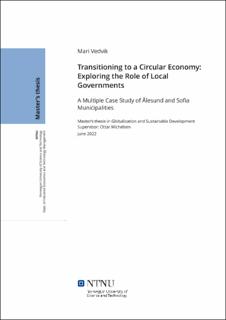| dc.contributor.advisor | Michelsen, Ottar | |
| dc.contributor.author | Vedvik, Mari | |
| dc.date.accessioned | 2022-10-07T17:30:26Z | |
| dc.date.available | 2022-10-07T17:30:26Z | |
| dc.date.issued | 2022 | |
| dc.identifier | no.ntnu:inspera:116563288:67123674 | |
| dc.identifier.uri | https://hdl.handle.net/11250/3024663 | |
| dc.description.abstract | Vi står ovenfor omfattende miljø- og klimaproblemer som har gjort det nødvendig å se etter nye løsninger for ansvarlig forbruk og produksjon, og alle samfunnsaktører må både tilpasse seg og jobbe for å nå FN's bærekraftsmål. Den sirkulære økonomien (CE) har fått stadig mer oppmerksomhet i akademia, industri og politiske agendaer som en praktisk strategi eller verktøy for å oppnå bærekraftig utvikling. Det eksisterer betydelig forskning angående implementering og innføring av sirkulær økonomi i land, bransjer og bedrifter, mens lokale myndigheters rolle i overgangen til en sirkulær økonomi har vært lite forsket på. I et forsøk på å bidra til forskningen på hvordan lokale myndigheter kan legge til rette for overgangen til en sirkulær økonomi, gjennomfører denne oppgaven en kvalitativ multiple case studie om kommunal planlegging, strategier og initiativer for å utvikle den sirkulære økonomien, med Ålesund kommune i Norge og Sofia kommune i Bulgaria som analyseenheter. Med denne tilnærmingen er målet å utvide kunnskapen om rollen til lokale myndigheter i overgangen til en sirkulær økonomi, vise nye perspektiver på tilnærminger, muligheter og hindringer angående implementering av sirkulære prinsipper i en kommunal kontekst, og inspirere til videre forskning knyttet til hvordan lokale myndigheter kan legge til rette for og bidra til overgangen til en sirkulær økonomi. De sentrale funnene i denne oppgaven antyder at lokale myndigheters tradisjonelle rolle som offentlig tjenesteleverandør og innkjøpsenhet kan forklare hvorfor kommuner har mer suksess med å implementere CE-initiativer med fokus på f.eks. avfallshåndtering og offentlige anskaffelser. Funn fra intervjuer utført med ansatte i Ålesund og Sofia kommuner tyder på at lokale myndigheter anerkjenner deres rolle i å legge til rette for sirkulære praksiser og løsninger for innbyggere og bedrifter, men hva som kan gjøres i praksis må utforskes ytterligere, i tillegg til å undersøke på hvilke måter kommuner kan påta seg denne rollen. | |
| dc.description.abstract | In order to respond to the global environmental issues we are facing today, a transition towards more responsible consumption and production practices is needed, and all societal actors must transform and adapt to the sustainable development goals (SDGs). The circular economy (CE) has gained increasingly more attention in academia, industry and policy making as a practical strategy or tool to achieve sustainable development. Considerable research exists regarding implementation and adoption of CE practices in countries, industries and enterprises. However, the role of local governments in the transition to a CE needs further investigation. With half of the global population living in urban areas, local governments can play a significant role in facilitating CE strategies to local communities and businesses. In an effort to add to the research on how local governments can facilitate the transition to a CE, this thesis conducts a qualitative multiple case study on local government planning, strategies and initiatives for developing a CE, with Ålesund municipality in Norway and Sofia municipality in Bulgaria as the units of analysis. With this approach, the aim is to expand the knowledge on the role of local governments in the transition to a CE, bring new perspectives on approaches, opportunities and impediments regarding implementation of CE principles in a local governance context, and inspire further research on how local governments can facilitate and contribute to the transition to a CE. The central findings in this thesis suggests that local governments’ traditional role as a public service provider and purchasing entity is clear and straightforward, and may explain why municipalities have more success in implementing CE initiatives focusing on e.g. waste management and public procurement. Findings from interviews conducted with employees in Ålesund and Sofia municipalities suggest that local governments recognizes its role in facilitating circular practices and solutions for citizens and businesses, however, what can be done in practice in this regard needs to be further explored, in addition to investigating in what ways municipalities can successfully undertake this role. | |
| dc.language | eng | |
| dc.publisher | NTNU | |
| dc.title | Transitioning to a Circular Economy: Exploring the Role of Local Governments | |
| dc.type | Master thesis | |
